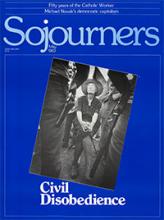I came into the pastorate of the Arvada Mennonite Church near Denver, Colorado, in 1965, having served previously as pastor in Fresno, California, and interim pastor with the Woodlawn Mennonite Church in Chicago's black South Side community. In Chicago I began to learn about the tension between the principalities and powers - the would-be lords of the world - and the principles and powers of the Word of the Lord.
Walking with black brothers and sisters of faith into the streets of Chicago helped remove some scales from my eyes. It freed me to see my pulpit and my people beyond ecclesiastical structures, to see my identity beyond the typical clergy functions of counseling, teaching, preaching, as well as laughing, crying, and celebrating with people - all of which I appreciate as cherished pastoral opportunities.
I took my first small step into civil disobedience in the late '60s, when my soul was troubled about paying taxes for war while preaching the gospel of peace: My wife, Marjorie, and I agreed to withhold half our income tax. We shared our decision with the congregation. The following year, after much discussion, the congregation decided to withhold payment of the federal telephone tax on the church phone. Both of these actions, while small in themselves, became significant opportunities for personal and corporate theological reflection on basic questions of faith and faithfulness.
In the '70s, people in the Denver area became more aware of the Rocky Flats nuclear weapons plant just 10 miles from Arvada. Here all the plutonium triggers for the U.S. nuclear arsenal are produced. We asked ourselves what the response of people of faith should be to this idolatry that blatantly invites the worship of our silent consent. What is pastoral responsibility in such a context?
Read the Full Article

